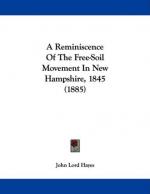|
This section contains 470 words (approx. 2 pages at 300 words per page) |

|
The Free-Soil Movement
Summary: The Free-Soil movement and the third political party that spawned it greatly influenced U.S. politics during the 1850s. The movement's chief issue was their opposition to the extension of slavery in the western territories, and the Free-Soil party attracted enough votes to swing the 1848 presidential election to Whig candidate Zachary Taylor. The Republican party, formed in 1854, retained many of the Free-Soil party's ideals and political viewpoints.
From 1848 to 1860, the Free-Soil movement influenced U.S. politics by swaying the results of the presidential election while also increasing participation of the common man in U.S. politics. The outcome of this party nearly destroyed the Democratic party while helping to create a new Republican party. The movement began roughly in 1848. Slavery was the most prominent and central issue of the Free-Soilers. They wanted to keep the West a land of opportunity exclusively for whites. They hoped to accomplish this by eliminating competition among the white majority, slave labor, and free blacks. Free-Soilers strongly opposed the admission of slave states into the Union though they did not necessarily demand an end to slavery.
The outcome of the election of 1849 was drastically affected by the presence of the Free-Soil party nominee and their political standing on slavery. In the election, the Whigs had nominated Zachary Taylor while the...
|
This section contains 470 words (approx. 2 pages at 300 words per page) |

|


